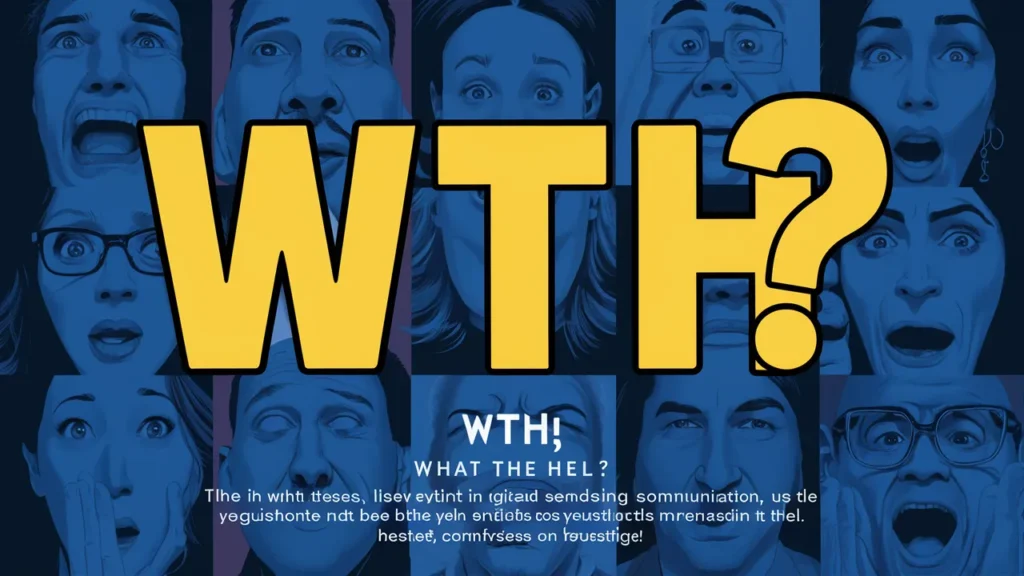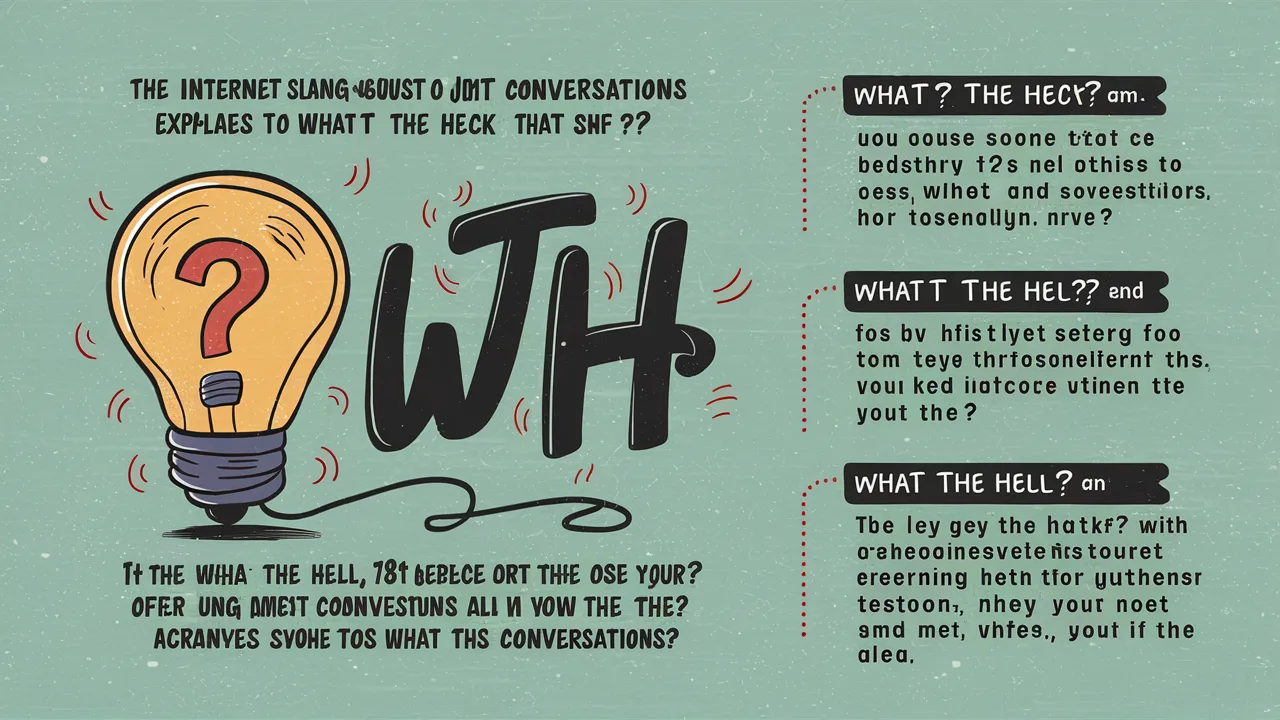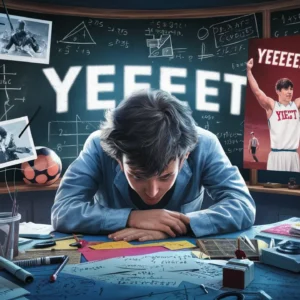The abbreviation “WTH” in text messages stands for “What The Hell.” It is commonly used to express surprise, confusion, or frustration in response to a message or situation. This abbreviation is part of the broader category of text slang that has evolved with the rise of digital communication, particularly in the last two decades
In the realm of digital communication, where brevity often reigns supreme, acronyms serve as linguistic shortcuts encapsulating a wealth of meaning in just a few characters.
Among the plethora of abbreviations that populate online conversations stands “WTH,” a succinct yet potent expression that resonates across text messages and social media platforms alike.
This seemingly innocuous trio of letters carries with it layers of interpretation, hinting at surprise, disbelief, or even exasperation, depending on the context in which it is deployed.
As denizens of the online sphere navigate through a landscape fraught with rapid exchanges and fleeting attention spans, decoding the essence behind “WTH” becomes not just a matter of comprehension but also one of cultural awareness.
Embedded within this acronym lies a mosaic of emotions and implications waiting to be deciphered by those well-versed in the nuances of modern communication.
From its humble origins to its pervasive presence in everyday discourse, exploring the multifaceted nature of “WTH” unveils insights into how language evolves within the digital domain, shaping interactions among teens, young adults, and an array of social media enthusiasts worldwide.
Journey further into this exploration to uncover the hidden depths behind what truly lurks beneath those three enigmatic letters — “WTH.
The origin of the acronym “WTH”
The origin of the acronym “WTH” traces back to its slang roots before making its way into mainstream digital communication. Initially used colloquially in spoken language, “WTH” began as a shorthand expression that captured surprise, disbelief, or confusion without explicitly stating the full phrase.
As instant messaging and texting gained popularity, abbreviations like “WTH” became essential for efficient communication in the fast-paced digital realm. This transition reflects how language adapts to technological advancements, where brevity and speed are paramount.
The evolution of “WTH” signifies a shift towards simplification and informalization of language in online discourse. Its journey from spoken slang to written abbreviation mirrors broader trends in communication styles among different age groups.
While older generations might perceive “WTH” as informal or even disrespectful due to its origins in colloquial speech, younger individuals embrace it as a convenient way to express surprise or confusion succinctly. Understanding this evolution sheds light on how linguistic innovations emerge from everyday interactions and find their place in digital conversations.
As technology continues to shape the ways we communicate, tracking the trajectory of acronyms like “WTH” offers insights into broader societal changes. The adoption of shorthand expressions reflects not only a need for efficiency but also a cultural shift towards informality and immediacy in online interactions.
By exploring the history and evolution of “WTH,” we unravel more than just linguistic transformations; we uncover how language adapts to meet the evolving demands of digital spaces while reflecting shifts in societal norms and values.
Interpretation of WTH Across Different Age Groups.
When it comes to the interpretation of the popular acronym “WTH” across different age groups, a fascinating divergence emerges between teens and young adults. For many teens, “WTH” is commonly understood as an expression of surprise or disbelief, often akin to “What the heck” in more polite terms.
This demographic tends to use it playfully when reacting to unexpected situations or strange occurrences in their digital conversations.
On the other hand, young adults may perceive “WTH” with slightly more intensity, seeing it as an abbreviated form of “What the hell,” expressing a stronger sense of shock or astonishment. This difference showcases how language nuances can vary even within generational cohorts.
Moreover, among social media users, the interpretation of “WTH” can hinge on context and individual communication styles. Some may use it casually in everyday interactions with friends online, while others might reserve it for instances where they are genuinely taken aback by something unusual or outrageous.
Understanding these variations in interpretation is crucial for effectively navigating digital communication spaces where brevity and quick reactions reign supreme. The ability to discern whether someone is using “WTH” as a light-hearted interjection or a genuine expression of disbelief can significantly impact the tone and flow of online conversations.
In essence, dissecting how different age groups and social media users interpret “WTH” sheds light on the dynamic nature of language in digital communication landscapes.
As slang terms like this evolve over time, they morph into multifaceted symbols that carry layers of meaning depending on who is using them and in what context they are deployed.
By appreciating these nuances, individuals engaging in online interactions can better grasp not just the surface-level definition but also the subtle variations that give acronyms like “WTH” their colorful richness within virtual dialogues.
Common Usages of WTH.
“WTH” is a versatile acronym that finds its way into various scenarios in online communication. One common usage of “WTH” is to express shock or disbelief when faced with something unexpected or absurd.
For instance, a teenager receiving an unexpectedly low test score might text their friend “WTH happened?”. In this context, the abbreviation conveys a sense of surprise combined with curiosity.
Another prevalent scenario where “WTH” is employed is to convey confusion or frustration regarding a complex situation.
Imagine someone encountering a cryptic message from a colleague about a sudden change in project requirements; responding with “WTH are they thinking?” encapsulates the sentiment of perplexity and exasperation clearly and succinctly. This use highlights how the acronym can efficiently communicate nuanced emotions in brief exchanges.
Furthermore, “WTH” often serves as an expression of mild annoyance or irritation in response to minor inconveniences. For example, someone overhearing gossip about themselves might text back with just “WTH,” signaling their displeasure at the situation without delving into lengthy explanations.
This illustrates how the acronym acts as a convenient shorthand for expressing discontent without escalating conflict unnecessarily. Overall, these examples underscore the adaptability and prevalence of “WTH” across different contexts in online conversations.
Perceived Tone of WTH.
When it comes to the perceived tone of the abbreviation “WTH,” its emotional connotations can vary significantly depending on the context in which it is used. For instance, in cases where someone encounters a surprising or unexpected situation, using “WTH” may convey a sense of shock or disbelief.
However, if employed in a casual conversation among friends, it might simply indicate mild confusion or curiosity without any negative undertones.
Furthermore, the tone and intention behind “WTH” can also be influenced by factors such as punctuation and capitalization. For instance, typing “WTH?!” with an exclamation mark can intensify the emotion behind the expression, suggesting heightened surprise or even frustration.
On the other hand, using all lowercase letters like “wth” could soften the impact and make it seem more laid-back or nonchalant.
In online interactions, where body language and vocal cues are absent, individuals often rely on textual elements like emojis or additional text to clarify the intended tone of their message when using “WTH.”
Emoticons like 😲 or 😕 paired with “WTH” can help add nuance to the expression, indicating whether the sender is genuinely bewildered, amused, sarcastic, or outraged. Consequently, careful consideration of these contextual cues is crucial for accurately interpreting the emotional nuances behind “WTH” in digital conversations.
Misunderstandings Surrounding WTH.
In the realm of online communication where brevity is key, misunderstandings can easily arise from the casual use of acronyms like “WTH.” One common confusion surrounding “WTH” is its potential misinterpretation due to its similarity to other acronyms such as “WTG” (Way To Go) or “WTF” (What The F***).
These similarities in abbreviations can lead to recipients misreading the intended message and responding inappropriately. For instance, if someone receives a message saying, “WTH, great job!” they might mistake it for a sarcastic response instead of an expression of genuine praise.
Moreover, depending on the context and relationship between communicators, the interpretation of “WTH” can vary significantly. When used among close friends or within specific online communities where inside jokes are prevalent, humor or sarcasm could be misconstrued by outsiders who lack the necessary context.

This misunderstanding may result in unintended conflicts or confusion. For example, a newcomer to a gaming forum might see the phrase “WTH just happened?” after a surprising game event and interpret it negatively rather than as an exclamation of astonishment.
Furthermore, cultural differences play a role in how “WTH” is perceived. What seems like a harmless expression in one culture could be considered rude or offensive in another. Without an awareness of these nuances, individuals using “WTH” across diverse cultural backgrounds may inadvertently cause offense or discomfort.
Considering these factors helps highlight that even seemingly straightforward acronyms can carry layers of complexity that influence how they are understood and received in digital conversations.
Trend Analysis: WTH vs Other Acronyms.
In the dynamic landscape of digital communication, acronyms like “WTH,” “OMG,” and “LOL” have become integral parts of online conversations. Analyzing the trends in their usage provides fascinating insights into how language evolves in the digital sphere. While “OMG” (Oh My God) has maintained its popularity over time due to its versatility in expressing surprise or disbelief,
“LOL” (Laugh Out Loud) has seen a shift towards more casual use, even sometimes devoid of genuine laughter. On the other hand, “WTH” (What The Heck/Hell) has carved a niche for itself by balancing mild exasperation with curiosity, making it a versatile acronym suited for various contexts.
The comparison between these acronyms showcases interesting shifts in their usage across different social platforms. Platforms geared towards younger demographics often witness higher instances of acronyms like “OMG” and “LOL,” reflecting trends in informal and humorous exchanges.

In contrast, platforms where informative or professional discussions dominate may see an uptick in the use of “WTH,” indicating a more measured tone amidst discussions about surprising or perplexing topics.
Moving on from trend analysis, exploring the impact of memes and pop culture references on acronyms like “WTH” unveils another layer of their societal influence. Memes have not only popularized the use of abbreviations like “WTH” but have also contributed to shaping its nuances and meanings within different cultural contexts.
For instance, a meme featuring a surprised cat accompanied by the caption “WTH is happening?” could alter how individuals interpret this acronym by associating it with humorous confusion rather than genuine incredulity.
Overall, delving into how acronyms trend and evolve alongside pop culture references illuminates the symbiotic relationship between language and digital culture.
As memes continue to redefine humor and communication norms online, acronyms like “WTH” will likely undergo further metamorphoses in meaning and usage, reflecting the ever-changing dynamics of internet linguistics.
Conclusion: The Ever-Evolving Meaning of WTH.
In conclusion, the exploration into the meaning and usage of “WTH” sheds light on its dynamic nature within digital communication. From its obscure origins to becoming a staple acronym in online conversations, “WTH” has undergone a remarkable transformation over time.
Analyzing how different age groups interpret this abbreviation and dissecting its varied perceived tones have revealed nuanced layers of meaning behind this seemingly simple phrase.
As language constantly adapts to societal shifts and technological advancements, acronyms like “WTH” exemplify the ever-evolving nature of communication in the digital age. Understanding that these linguistic tools not only convey information but also emotions and attitudes is crucial for effective online interaction.
As we navigate the vast landscape of online conversations, staying attuned to the changing nuances of acronyms like “WTH” will enhance our ability to engage thoughtfully in diverse digital environments.
Just as language evolves, so too do our interpretations and applications of these concise expressions, shaping the way we connect with others through text-based platforms.



